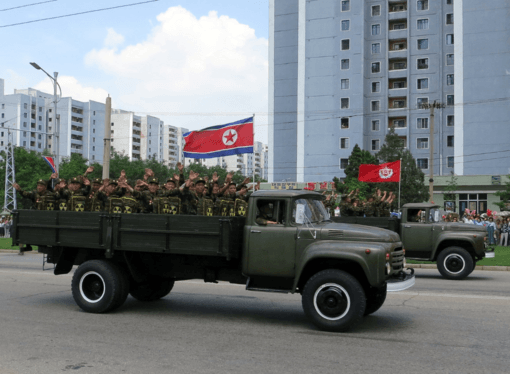
Photo by Stefan Krasowski | CC BY 2.0
As we head into the long Easter weekend, the US Carl Vinson navy strike group is moving toward the Korean peninsula. All eyes are focused on the calendar: May 15 when North Korea is widely expected to conduct the sixth nuclear test on the 102nd anniversary of the birth of North Korea’s founding leader Kim Il-Sung, the grandfather of the current head Kim Jong-un. Tension in the Korean peninsula has reached a feverish pitch, not seen in years if not since the end of the Korean War in 1952. Questions on the minds of most are:
1) Will Kim Jong-un defy the intense international pressure and go ahead with the sixth nuclear test?
2) Will America strike at North Korea if it conducts the test?
3) What kind of strike will it be: surgical strike at DPRK’s nuclear facilities, decapitation strike to take out Kim Jong-un, betting that a new leader that emerges will abandon nuclear tests, or a large-scale attack?
4) Will China intervene and under what circumstances?
Tension continues to escalate after the Trump-Xi summit, during which Trump ordered a missile strike at a Syrian airbase at Homs. Such show of force no doubt was partly done to send Xi a strong message that America will take action against North Korea if it insists on proceeding with its sixth nuclear test.
Both corporate and alternative media, such as Zerohedge, have, in recent days, been abuzz with speculation that China may take out North Korea’s nuclear facilities to avert another Korean War. There’re also reports that China has massed 150,000 troops at its border with DPRK either to prevent a huge influx of N Korean refugees in the event of war, or ready to come to North Korea’s defence should it be attacked, as in the first Korean War. There were also reports of China acquiescing to an American strike at North Korea.
Against such torrents of wild speculation, China’s position remains unchanged: That the problem in the Korean peninsula should be solved by diplomatic means, not use of force. An editorial in semiofficial daily Global Times on 5 April put it this way:
“The US must bear the major responsibilities for the mess in Northeast Asia, as it has buried too much strategic distrust in the region. For North Korea to abandon its nuclear ambition voluntarily, it must be convinced the major powers can collectively guarantee its security. But Pyongyang now trusts nothing but nuclear weapons. Despite rounds of sanctions, as long as the regime can hang on, it is unlikely to surrender.
“Before Trump, each US administration generally followed the path of escalating sanctions and military threats over Pyongyang while strengthening security commitments to Seoul. Washington has never tried to seriously communicate with Pyongyang and urge it to abandon its nuclear programme by relieving Pyongyang’s security anxiety.
“When the old strategy doesn’t work, Washington blames China for not cooperating with it. China in fact has imposed very stringent sanctions against North Korea. The accusations are used to defend Washington’s failed policy.
North Korea has every reason to distrust America for a long string of its broken international promises or commitments, from NATO expansion eastward and Iran nuclear deal to Bush Jr. tearing up Bill Clinton’s deal with North Korea to supply light-water nuclear power plants in return for destruction of North Korea’s nuclear facilities. America has deepened the suspicion by staging ever larger and more belligerent annual exercises with South Korea near North Korea.
Facts are abundantly clear: War and peace in the Korean peninsula hinges on America, rather than North Korea, much less China. China has done all it could to dissuade North Korea from continuing its nuclear programme. So much so that It has backed and observed UN sanctions against its once close ally with which it has a defence treaty. Which country in the world has ever done that to its ally?
Even as China-led Six-Party Talks goes on in fits and starts, North Korea and America engaged in direct backchannel talks for some years without success. America rejected North Korea’s demand that they sign a peace treaty first before North Korea would abandon its nuclear programme. The thing is America should have signed such a peace treaty within three years of the armistice of the Korean War. That America had refused to meet the terms of the armistice gave North Korea cause to doubt America’s good faith.
The Global Times editorial drew a Red Line on the North Korea issue: “China has a bottom line. It will safeguard the security and stability of its Northeast area at all costs.” China analysts have elaborated on the Red Line:
1) No nuclear contamination spilling from North Korea into Northeast China.
2) No massive influx of North Korean refugees into China.
3) No regime hostile to China emerging in North Korea.
4) No foreign military presence in the opposite bank of the Yalu River.
No. 1 and 4 are as much directed at America as North Korea. Trump and Pentagon warmongers ignore the Red Line at their peril, as McArthur did crossing the 38th parallel that brought the People’s Liberation Army into the Korean War. And like McArthur, they wouldn’t be able to go home for Christmas!